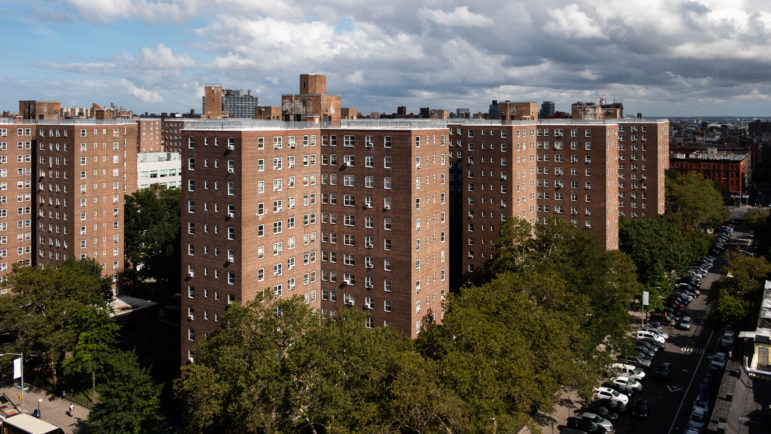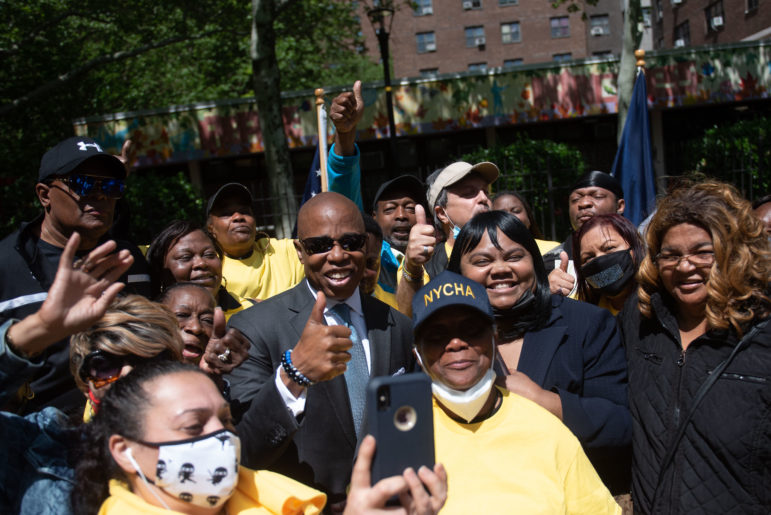Proposed legislation would allow NYCHA to transfer 25,000 apartments into a publicly owned trust with the power to issue bonds and borrow money for addressing desperately-needed capital repairs. Supporters say it’s the only real shot to drum up the funds in lieu of substantive federal aid. But many public housing tenants are opposed or skeptical of the plan.

Adi Talwar
A view of NYCHA’s St. Nicholas Houses near the intersection of Frederick Douglass Boulevard and West 127th Street in Harlem.Update: After this story was published, both chambers of the NYS Legislature passed the NYCHA Blueprint legislation on Thursday, June 2, 2022.
As the end of New York’s legislative session approaches, state lawmakers appear poised to approve a measure intended to shore up cash for thousands of deteriorating NYCHA apartments despite concerns from many tenant leaders.
The legislation would allow NYCHA to transfer 25,000 apartments into a publicly owned trust with the power to issue bonds and borrow money for addressing desperately-needed capital repairs. To unlock those investments, the proposed New York City Public Housing Preservation Trust would convert the federal funding mechanism for each unit from a public housing operating fund outlined in Section 9 of the U.S. Housing Act to Section 8 rental assistance vouchers, which come with more money from Washington.
The Trust has been billed as a “public option” in contrast to the ongoing conversion to private management at dozens of NYCHA campuses under the Rental Assistance Demonstration-Permanent Affordability Commitment Together (RAD-PACT) model. About 400,000 New Yorkers are authorized to live in NYCHA’s 177,00 apartments—the Trust would potentially apply to about 15 percent of those units—but the actual number of residents is undoubtedly higher (experts say it is more like 500,000 to 600,000).
The bill gained little traction before its sponsors pulled it last year, but now has support across the Democratic Party spectrum, uniting Gov. Kathy Hochul and Mayor Eric Adams—who rallied for its passage May 23 at the Polo Grounds housing complex—with progressive elected officials like Comptroller Brad Lander, and socialist legislators, like Senate sponsor Julia Salazar.
“One thing that’s clear, we need to stop playing with this,” Adams said of the crumbling conditions at NYCHA campuses citywide. “We’re not getting money from the federal government this year. They’re not. They already told us, ‘We are not concerned with NYCHA residents.’”
Congress failed to pass the Build Back Better package, which would have directed about $80 billion to public housing nationwide—much of that going to NYCHA, the nation’s largest public housing system, and its estimated $40 billion in needed capital repairs.
“So we must do it on our own,” Adams said. “Here’s a way to do it.”
Trust the Trust?
Despite that encouragement, the measure has proved a tough sell for many NYCHA residents, including nine of the 10 members of the Citywide Council of Presidents (CCOP), a representative body that issued an open letter May 9 opposing the Trust or “any conversion efforts to Section 8.”
NYCHA residents have already been burned by decades of disinvestment, mismanagement and unfulfilled pledges to revitalize their ailing infrastructure, remove toxic lead paint and fix routinely-busted boilers, said Manny Martinez, South Jamaica Houses Residents Association President and interim CCOP chair of Queens South.
“You fool me once, shame on you. You fool me twice, shame on me,” Martinez said. “We’ve been fooled. How many times are we going to be fooled?”
Martinez said he fears tenants will lose their public housing rights under the Preservation Trust, a key component of the NYCHA’s two-year-old “Blueprint for Change,” though the legislation explicitly states that tenants in Trust buildings will maintain the same rights they have under Section 9 housing.
Many public housing advocates have joined NYCHA tenants at rallies and written op-eds to amplify concerns about accountability, bond repayment and a fundamental end of public housing.
If the Trust’s debt grows too onerous, the entity could potentially use tenants’ voucher revenue to pay off loans rather than make repairs, said Kristen Hackett, a doctoral student and executive committee member in Queens’ Justice For All Coalition.
“Rather than alleviating the current deficit and deterioration created by federal disinvestment, the Trust would likely create a larger public debt problem that will continue to cause problems for residents,” Hackett said. “Only in that scenario, there are more barriers to public oversight and accountability than exist now.”
CCOP Chair Daniel Barber, who represents Bronx South as a tenant leader at the Andrew Jackson Houses, also signed the letter opposing the Trust plan, but said he thinks all residents should get to choose the future of their homes.
“I, Daniel Barber, do not support it, but I, Daniel Barber, still feel that my residents should be able to hear it, listen, direct it, digest it, comment, ask questions and if they choose to vote if they want it or not, that’s a process that the residents have to choose,” he said.
That’s the crux of the pitch being made by supporters of the Preservation Trust.
The latest text of the bill would give tenants the chance to vote to opt into the model and convert their subsidized units to Section 8 Tenant Protection Vouchers. That subsidy comes with more funding from the federal Department of Housing and Urban Development and would allow NYCHA to borrow money. While the average Section 9 unit received $1,250 a month in federal funding in 2019, the average Section 8 unit received $1,900 a month, Gothamist reported.
“The tenants will be able—not just the [tenant association] presidents—but the tenants themselves will be able to take a vote and decide which type of program they would like to select,” said New York City’s Chief Housing Officer Jessica Katz.
Adams also touted the options that tenants will have if lawmakers pass the current version of the Trust. He pointed out that residents will serve on “quality assurance committees” and get to vote on vendors contracted to make repairs.
But the bill’s opt-in clause has raised questions. The vote would require a “minimum percentage” of tenants to participate, according to the text of the legislation, but, as THE CITY noted, the bill does not spell out what constitutes that percentage. That means a small minority of residents who show up to vote could determine the housing future for entire complexes.
“There needs to be a threshold. Twenty residents shouldn’t be able to vote to enter the Trust,” Queens Assemblymember Khaleel Anderson, an opponent of the current version of the bill, told City Limits Friday.
Anderson was one of 10 assemblymembers who drafted a list of changes they want to see added to the bill before they support it, but he said he expects it to pass even without their backing. The measure advanced out of the Housing and Codes Committees earlier this month. “They’re trying to strong-arm us,” Anderson said.
A NYCHA spokesperson said residents and other members of the public will have a chance to weigh in on the voting percentage issue before the agency releases a set of proposed requirements. They would have 60 days after the Trust becomes law to release the proposal. The Trust cannot take over a building until a vote is finalized, the spokesperson said, citing text of the legislation.

Michael Appleton/Mayoral Photography Office
Mayor Eric Adams rallied with NYCHA tenants in support of the Trust on May 23, 2022.Federal aid ‘just not on the horizon’
Residents from around the city flanked Adams and Katz as they stumped for the Trust, with the lone member of CCOP to sign off on the plan urging state lawmakers to enact the proposal so that the agency could raise revenue and fund repairs.
“The legislation would allow NYCHA to get the federal resources that all my residents deserve,” said Barbara McFadden, the tenant association president at Sheepshead Bay’s Nostrand Houses.
McFadden said she understands the skepticism among many of her peers. She told City Limits she was “dead set” against the Trust when she first heard the proposal but warmed to it as she learned more details.
“No one is going to be displaced,” she said. “We still pay 30 percent of our income.”
Support among some progressives and socialists—who would otherwise prefer direct federal investment in housing—boils down to pragmatism. Staying the course dooms NYCHA because federal aid is “just not on the horizon,” Lander said.
“If we don’t fix the roofs, and fix the system and modernize the buildings, there will come a time and it will not be that long from now when the buildings themselves simply cannot be saved and renovated,” he added. “And if we get past that point we will be in an impossible situation.”
And while Adams repeated the slogan “Trust the Trust” and asked for the words to be written on a t-shirt, he acknowledged that public housing tenants should indeed be wary of the latest plan to fix their homes.
In fact, no one should be more skeptical than NYCHA residents, said Community Preservation Corporation CEO Rafael Cestero, a former city Housing commissioner. But Cestero, a Trust supporter, said the restructuring will result in concrete remedies for NYCHA’s festering problems.
“NYCHA residents are the single most practical people I’ve come across: They want the roof over their bathroom fixed, they want their plumbing fixed, they want their toilet to work,” he said. “Residents’ skepticism is only overcome by action, by fixing things.”
In an interview Friday, Cestero declined to predict whether state lawmakers will actually pass the measure.
There is political calculus involved for incumbent lawmakers heading into the heat of primary season. It’s an issue potentially hindering other housing proposals, like a replacement for an expiring developer tax break and a measure to protect renters in non-stabilized apartments.
While Anderson said he believed the bill would pass, seven other state lawmakers contacted Friday morning said its fate was far from certain. Hours later, after spending most of the day discussing proposals to limit gun ownership in the wake of mass shootings in Buffalo and Uvalde, Texas, Senate Democrats had begun to conference the NYCHA bill by evening time Friday.
“Looking good,” one senator told City Limits.
An assemblymember with a handful of NYCHA complexes in their district said they had received little feedback from constituents. “I got more pushback on RAD,” the lawmaker said.
So will it pass?
“No clue,” they said. “NYCHA pushing hard though.”
A third lawmaker said the bill seemed to have the votes and the momentum behind it, but added a caveat.
“Nothing’s ever certain in Albany,” they added.
Read more housing and development news:








